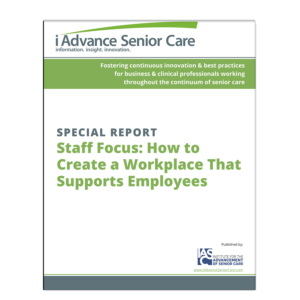Working With Partners to Hire in the Community
| BY JOHN WEISER |
| Working with partners to hire in the community How to surmount cultural and other gaps restricting your labor pool |
| Do you worry about where your future workforce will come from? Have you tried to explore alternative strategies for retaining and advancing workers, but were met with limited results? Innovative partnerships with community organizations can help you to both attract and advance employees from underserved communities across America-and reduce costs at the same time. For example, consider Genesis HealthCare, one of the United States’ largest long-term care and rehabilitation therapy providers. Genesis HealthCare has created a unique approach to the industry’s workforce shortages. Through its partnership with WorkSource Partners, a workforce development organization based in Brookline, Massachusetts, it increased retention and was able to reduce costs associated with staffing agencies in its Massachusetts sites from $1 million annually to nearly zero. Like many businesses in long-term care, Genesis HealthCare has been faced with acute workforce shortages. The Bureau of Labor Statistics (BLS) projects that the number of direct-care jobs (RNs, CNAs, nurse assistants, home health aides) in the industry will grow from 1.9 million to 2.7 million within this decade-a 5.6% annual growth rate. Yet during the same period, BLS predicts only a 1.1% growth in the labor force. For Genesis HealthCare, the vacancy rate for LPNs and RNs among its 45 New England region sites was already 12.9%-equating to 161 vacancies. Compounding this supply problem are the anticipated retirements of 200 New England’based Genesis HealthCare nurses in the next five years (from 2006 to 2010). As a result, to meet their staffing needs, Genesis HealthCare’s Heritage Hall facilities had been spending $1 million per year on LPN and RN staffing agencies alone. That’s why Genesis HealthCare worked with WorkSource Partners to develop the Heritage Hall Campus on Campus program. WorkSource Partners provides and coordinates training, career counseling, and hiring services for companies such as CVS/pharmacy, Genesis HealthCare, Gillette, and Partners HealthCare System. It helps its clients invest in their entry-level workers and address the significant “skill gaps” in today’s workforce through the delivery of career initiatives for these workers. Campus on Campus is a career advancement program that helps entry-level workers (many from underserved communities) in CNA, housekeeping, and dietary positions move on tracks toward LPN and RN jobs. The program takes a three-pronged approach: (1) It provides intensive career counseling to employees, (2) it facilitates access to education and training programs, and (3) it cultivates management support within the organization. As part of the program, local community colleges provide training and education services directly at the Genesis HealthCare work site, offering a continuum of education in five broad areas of need:
The net result is new career and job growth opportunities for current staff and significant cost reductions to Genesis HealthCare through increased retention rates and a reduced need for temporary agency hires. Background The Campus on Campus program is now in the planning phases of expansion across all Genesis HealthCare system sites in Massachusetts and in parts of Connecticut. New Book In basic concept, companies create partnerships with workforce development organizations, government agencies, and community colleges to design tailored training programs that meet both their needs and those of their employees. The companies provide guidance on the demand for trained workers and on the specific skills that the workers need to possess in order to advance. Employers may also provide input on curriculum development and equipment. In certain cases, they may even provide their own supervisors as teachers and trainers, ensuring that students are trained in the “company way” before they ever arrive on the job. In addition to strategies to build successful partnerships and strategic alliances, Untapped offers four more recommendations for organizations attempting to work with underserved communities for mutual benefit:
The social networks that connect your organization to good recruits from underserved communities may be weak or nonexistent. You can address this by working to build a social network from among your company’s employees or through community involvement activities, or you may tap into existing ones through partnerships with organizations that have extensive ties in these communities. When you first hire employees from underserved markets, you may find that workforce entry, retention, and advancement pose unique challenges. Companies that have succeeded in these communities have developed approaches such as providing training to employees and supervisors on the “soft skills” needed to perform well in the workplace, helping employees to get access to supportive social services, and building training opportunities tailored to the needs of this workforce. A dramatic increase in workforce diversity in your company, if not managed well, can lead to miscommunication, misunderstanding, and conflict. To successfully integrate new recruits into an existing workforce, it can be important to increase awareness of the issues created by cultural diversity, and to create a “safe space” to raise and resolve resulting concerns and conflicts. In the United States and in many other countries, the education system sometimes does not adequately prepare the emerging workforce for the jobs that employers need to fill. The web of social supports required for a workforce to get to work and to stay at work-transportation, child care, affordable housing-may be frayed or absent. Your organization can join with others to help drive improvements in an enabling environment so that recruits arrive at your facility ready and able to work in today’s challenging environments.These approaches have enabled organizations like yours to successfully hire from, sell to, and purchase from undeserved communities in ways that create benefits for both company and community. |
| John Weiser is coauthor of the new book Untapped: Creating Value in Underserved Markets (Berrett-Koehler 2006, 200 pages, $28.95), and a founding partner at Brody Weiser Burns. He holds a master’s degree in Public and Private Management from the Yale School of Organization and Management. For more information on the book and on coauthors Steve Rochlin, Michele Kahane, and Jessica Landis, visit www.untappedbook.com. To send your comments to the author and editors, e-mail weiser0806@nursinghomesmagazine.com. |
I Advance Senior Care is the industry-leading source for practical, in-depth, business-building, and resident care information for owners, executives, administrators, and directors of nursing at assisted living communities, skilled nursing facilities, post-acute facilities, and continuing care retirement communities. The I Advance Senior Care editorial team and industry experts provide market analysis, strategic direction, policy commentary, clinical best-practices, business management, and technology breakthroughs.
I Advance Senior Care is part of the Institute for the Advancement of Senior Care and published by Plain-English Health Care.
Related Articles
Topics: Articles , Staffing











